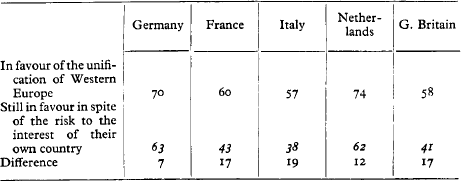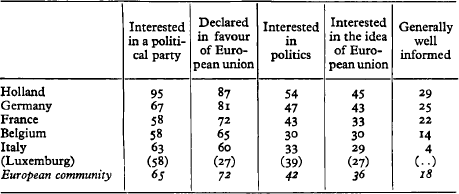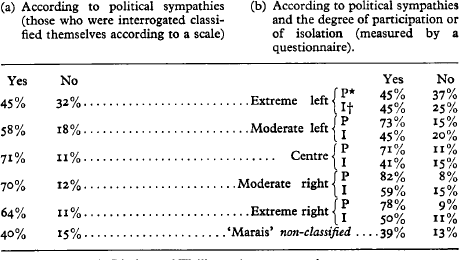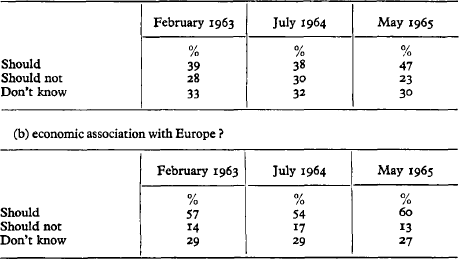Published online by Cambridge University Press: 28 March 2014
Parallel with the efforts which have been made during the last fifteen or twenty years to build, in Churchill's words (1946) ‘a kind of United States of Europe’, much research has been undertaken to try to find out whether public opinion had followed the movement, or perhaps even anticipated it.
I do not intend to recapitulate here in detail all these works, but merely to underline some of the problems which they raise, for the researchers as well as for the men of action and above all for those who, perhaps over-ambitiously, try to reconcile the concerns of the former with those of the latter.
1 The reader is referred to two recent studies which I have published on the subject: L'information des Européens et l'intégration de l'Europe, Institut d'études europeennes de l'Universite libre de Bruxelles, 1965 and L'opinion publique et l'Europe, Institut de Sociologie de l'Université libre de Bruxelles, 1966.
2 ‘Where stands Freedom? A Report from the World in the Spring of 1948’, Time, New York, April 1948.
3 Cf. Sondages, revue française de l'opinion publique, Paris, 1963, No. I and journal of Common Market Studies, Oxford, November, 1963, Vol. II, No. 2.
4 Cf. Britain and the European Common Market, Social Surveys (Gallup Poll) Ltd, November, 1961. Also the collection of Gallup Political Index, summarized in ‘British Attitudes to the EEC 1960–1963’, journal of Common Market Studies, September 1966, Vol. V, No. I.
5 Michel Debre in a lecture to the ‘Jeune Barreau’ of Brussels, quoted by La Libre Belgique, 26 January 1963.
6 Georges Pompidou in a speech in the National Assembly, journal Officiel de la République française, 13 June 1963.
7 Out of loo people interviewed, the answers were as follows:

Source: Public Opinion in Western Europe. Attitude towards Political, Economic and Milirary Inrefration. United States Information Agency, January 1953, pp. 10-11.
8 Out of 100 persons interviewed, the answers were:

Source: Attitudes towards European Union, the Common Market and Euratom. West European Public Opinion Barometer. US Information Agency, Report 50, 12 August 1957.
9 Out of too people interviewed among the upper classes, the answers were as follows:

Source: Attitude toward European Union, op. cit, August 1957.
10 Question: 'Would you be in favour or opposed to France becoming part of a European union in which certain important political decisions would be made by a central authority rather than by each of the member countries?

Source: Institut francais d’opinion publique.
11 Sondages, 1963, No. I and journal of Common Market Studies, November 1963, op. cit.
12 New Society, op. cit.
13 See p. 448.

The figures for Luxemburg need to be confirmed.
Source: Gallup International. Cf. J.-R, Rabier, L’information des Europkens et l’intigration de I’Europe, op. cit., pp. 40-1.
13 Out of 100 persons interviewed in 1962:
14 Deutsch, Emeric, Lindon, Denis and Weill, Pierre, Les families politiques, aujourd'hui en France. Les Editions de Minuit, Paris, 1966, p. 16.Google Scholar The authors add: 'Those who participate, as defined, represented in 1966, 37% of the electorate and the isolated, 63%.
15 Proposition: ‘Livelier efforts are needed to get the Common Market going.’
Answers:

Source: Deutsch, Lindon and Weill, op. cit., pp. 112 and 119.
16 Question: ‘If a united Europe comes into being, what overriding purpose would you want it to serve and what would you above all hope for?’

Source: Sondages, 1963, No. I, p. 47.
17 Question: Do you think Britain should or should not try to achieve (a) political association with Europe?

Source: Gallup Political Index, No. 38, March 1963, No. 53, Ausut 1964 and No. 60-1, May 1965.
18 L'image de l'Europe unie dons l'opinion publique. A study undertaken by International Research Associates Europe – Provisional report (unpublished) December 1966.
19 Stéphan Bernard. Unpublished contribution to the international symposium of the Centro Italian di Ricerche e Documentazione, Rome, November 1966.